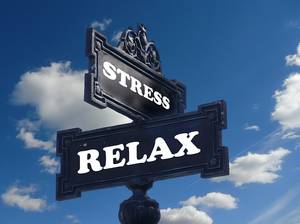How to become less stressed
Interview with
Peter Kinderman took Graihagh Jackson through the tools we can all use to help  us feel a little more relaxed...
us feel a little more relaxed...
Peter - You can learn to react in a more helpful way. Like everything, if I'm playing tennis, which I'm rubbish at and somebody serves me a ball and I hit it back very, very poorly, I don't think I've chosen to be inept at playing tennis. I need to be trained, I need to learn, I need to practice, and with practice, with the help of a coach, I'll be better at returning the ball. And when people are stressed, when people are depressed, when people are anxious, with help they can learn to deal with those circumstances in many faces in a more helpful way.
Graihagh - This is sometimes known as CBT - or cognitive behavioural therapy and Peter has designed an app called Catch It, that helps you think about the way you feel and modify your mood. Although Peter does stress that this isn't a replacement for therapy.
But the big picture here though is one that Peter painted earlier - how we need a shift on a societal level in how we approach mental health care in the first place...
Peter - I have to say, speaking in the office of the President of the British Psychological Society, I think we collectively need to campaign for a better society. One of the things that I do is that I'm involved in what could broadly be termed the happiness agenda looking at wellbeing as a target for government activity.
So the idea there for many prizewinning Nobel prizewinning economists is that, as well as boosting the nation's wealth, what we should be doing, the aim of government, is to take those policy decisions that improve the wellbeing of citizens. And I think that for us as a society, we could all collectively do with taking policy decisions and, therefore, for individuals voting for those circumstances that would make life better. We should be choosing policies that make our living conditions better rather than choosing policies that merely make us wealthier.
Now that's a long way from taking an individual who is going to their GP and asking for help, but I think it is important to remember that the circumstances in which we live collectively are the product of human decision making and we need to remember that. I think there are things that you can do with support, with help.
I think that, for instance, with trade union help, with the help of colleagues, I think people can take individual and collective action to improve their working conditions. I think we've just seen the junior doctors, for instance, taking action in standing up against government proposal to change their working practices. I think it's very difficult for some individuals working in some companies or living in some marriages, to themselves, to just take action to improve things but working collectively we can do things and I think I would like, especially in this context, to just emphasise the fact people are not necessarily as powerless as they sometimes feel.
Graighah - I.e. We need to see mental health problems less on an individual basis because it ignores the wider issues of why we get stress in the first place...
Peter - For me, I think it's an incorrect analysis situation to say that the problem lies within yourself. So, I think to say that your are experiencing very stressful circumstances and that you are responding to those circumstances in a way which may or may not be helpful, that's OK, but to say you have an illness or have a disorder I think does a number of things. It implies that what's happening to you is abnormal in some way and I think that's in the very least questionable for most people. Most people are responding perfectly normally to very difficult situations. So to label it a disorder or an illness I think is a mistake. To locate it within the individual is a mistake because I think that normally people are stressed by external circumstances as I've said. I think to then suggest that that's in some way indicative of a chemical imbalance or some sort of abnormality of the brain I think is very dubious and worrying. I think there's very little evidence for that in the majority of cases and although medication can sometimes be helpful for people, I think we know of lots of psychoactive drugs that people take: nicotine, alcohol, street drugs, caffeine. These all affect how we feel, and how we behave, and how we think, but I don't think we put those forward as cures for disorders.










Comments
Add a comment